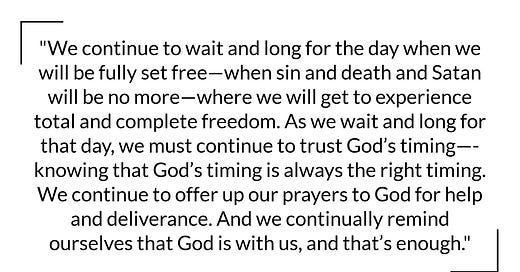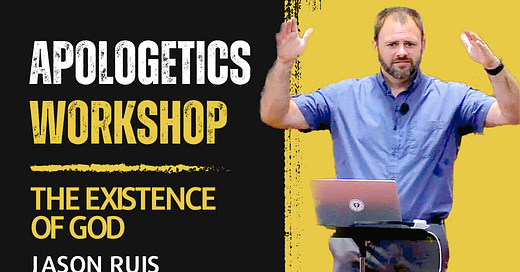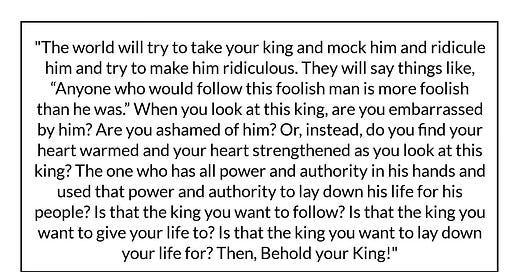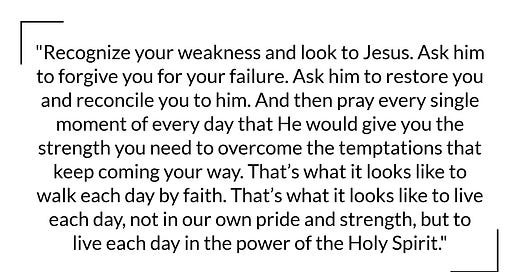
[Read Exodus 3:6-12]
As I mention on a regular basis, Advent is a season of waiting and longing. It’s a season where we focus on and lean into the tension of the already, not-yet. Much of that tension is felt as we live in a broken world—where things are messy and saturated with difficulty—rejoicing that Christ has been born and has brought salvation, yet still longing for the day when Christ will return to make all things new.
As we live in that tension, we repeatedly find ourselves in situations that seem like they are far beyond our abilities. We’ll find ourselves parenting a struggling child and feeling completely inadequate because we’ve tried everything and it’s still not working. We’ll find ourselves in the middle of a chronic health issue that keeps wearing us down more and more, finding ourselves wondering how in the world we’ll be able to go on. We’ll find ourselves thrown into various situations, being asked to lead a group or project that seems way beyond our competency, and we find ourselves repeatedly asking, “Am I the right person for this job? Really?” The question is, how do we respond when we find ourselves in those types of situations? What gives us strength to keep moving forward? What do we tell ourselves—or those around us—in those moments? I can tell you one thing, the world is going to give you very different advice here than you’re going to find in the Bible.
Before we dive into this morning’s passage, I want to look at something that happened between last week’s sermon and this week’s sermon. If you remember, last week’s sermon was focused on this beautiful promise from God to Abraham that he was going to give his offspring land, bless them, make them a great nation, and that through them all the nations of the earth would be blessed. Yet, we were also reminded that it hadn’t happened yet. A few chapters later, Abraham has some questions for God. God said, ““I am the LORD who brought you out from Ur of the Chaldeans to give you this land to possess.” But [Abram] said, “O Lord GOD, how am I to know that I shall possess it?”” (Genesis 15:7–8, ESV). God answers this question with the famous covenantal ceremony, where Abram cut the animals in half and then God walked through the animals by himself to show that he would die in order to keep the covenant—which is such a beautiful picture that has some obvious ramifications.
Yet, that’s not what I wanted to focus on here. In the midst of this beautiful promise of God, we read this from him, “Then the LORD said to Abram, “Know for certain that your offspring will be sojourners in a land that is not theirs and will be servants there, and they will be afflicted for four hundred years. But I will bring judgment on the nation that they serve, and afterward they shall come out with great possessions. As for you, you shall go to your fathers in peace; you shall be buried in a good old age. And they shall come back here in the fourth generation, for the iniquity of the Amorites is not yet complete.”” (Genesis 15:13–16, ESV). There’s a lot that we could talk about in that passage, but I want to focus on the first part. Remember, Abram has just asked God, “How will I know that I will possess this land?” and God responds, “You can be certain that you offspring will live as exiles in a foreign land as slaves, and they will suffer for four hundred years, but after that I will bring them into this land. You can count on that.”
What I want you to recognize is that baked into God’s beautiful, powerful promise was the exile in Egypt. Baked into God’s beautiful promise was affliction and suffering. The tension between the already and the not-yet was very high as God’s people suffered greatly as slaves in Egypt. How did they respond in the midst of that tension?
We read this in Exodus 2: “During those many days the king of Egypt died, and the people of Israel groaned because of their slavery and cried out for help. Their cry for rescue from slavery came up to God. And God heard their groaning, and God remembered his covenant with Abraham, with Isaac, and with Jacob. God saw the people of Israel—and God knew.” (Exodus 2:23–25, ESV). They cried out to God in the midst of their affliction and suffering. They didn’t just complain—although there was some of that, I’m sure. This passage says that they cried out for help and deliverance for God. They groaned as they asked for help. And as they prayed, and cried out and groaned for help from God, they waited and longed for deliverance—longed for God’s promise to be fulfilled.
When God shows up to Moses he says, “I am the God of your father, the God of Abraham, the God of Isaac, and the God of Jacob.” (Exodus 3:6, ESV). Why does God say this? On the one hand, it’s God’s way of identifying himself to Moses, but more importantly, it’s God’s reminder to Moses about what he has promised. These are His people and he has made a promise to those people and now he’s going to fulfill that promise and bring them into the land.
I want to pause for a moment to remind us of something we’re all aware of, but need to be reminded of on a regular basis. God’s timing is very different than our timing, or as Peter will say, “The Lord is not slow to fulfill his promise…” (2 Peter 3:9, ESV). Now, we need to be honest, if God has promised us something, we think that we should have it right now—we’re impatient. We think we’ve done a good job—and feel a little self-righteous—if we’ve waited a year for God to fulfill his promise and VERY good if we’ve waited five years for God to fulfill his promise. What about 400 years? Isn’t there something inside you that says: Yeah, that’s really slow. Or, how about the thousands of years that went by between the fall of Adam and Eve and Jesus’ birth? Was that slow? What about the two thousand years that have gone by since Jesus ascended into heaven? Is that slow? Although, we’re tempted to answer all of those questions with, “Of course!,” the right answer is: NO. God is not slow to fulfill his promises.
And that needs to be a reminder to us as we find ourselves growing impatient in the midst of our own suffering and waiting and longing. God’s timing is not our timing, of course. But we also need to remember that God is much wiser than we are, and that God sees the beginning from the end, and that God is the one who is writing the story of the universe and the story of your life. That means that, although God’s timing is not our timing, it means that God’s timing is always GOOD. God’s timing is the best timing. That means we need to learn patience, we need to learn how to cry out to God in prayer, asking him to help us, as we wait and long for deliverance.
We also need to remember that God is not unaware of what is happening to us. When God comes to Moses he says, “I have surely seen the affliction of my people who are in Egypt and have heard their cry because of their taskmasters. I know their sufferings..and I have also seen the oppression with which the Egyptians oppress them.” (Exodus 3:7–9, ESV). God saw what was happening to his people. He saw their suffering and affliction. He saw the abuse from the taskmasters. He saw how the Egyptians oppressed his people. He heard their cries for help. He was attentive to what was going on.
That gives us hope and comfort in a few different ways, but I want to focus on one of them in this sermon. The Egyptians were not getting away with their cruelty and oppression. God saw every one of their evil deeds and will do something about it. In moments like these—especially in moments of exile—it can seem like God is allowing injustice to flourish. That the evil are winning and the righteous are losing. It can seem like God is simply closing his eyes to all of the evil and wickedness we see in the world—or the evil and wickedness we are experiencing in our own lives. Yet, this is a reminder that God is watching. He sees it all. And just because he hasn’t acted yet, doesn’t mean he’s never going to act.
We read this in Romans: “Or do you presume on the riches of his kindness and forbearance and patience, not knowing that God’s kindness is meant to lead you to repentance? But because of your hard and impenitent heart you are storing up wrath for yourself on the day of wrath when God’s righteous judgment will be revealed.” (Romans 2:4–5, ESV). God’s lack of judgement on evil and wickedness right now is not a sign that he doesn’t care—or that he’s going to overlook evil. Rather, he’s being patient, desiring that people would repent, receive forgiveness, and be restored. Yet, for all those who refuse to repent, they are storing up wrath for themselves on that day when he comes again. And on that day, God will judge every single evil dead. For those who are in Christ, that judgement fell on Jesus Christ, but for those outside of Jesus Christ, that judgement will fall on them.
Yet, the theme of Advent is the already, not-yet. That final judgement is the not-yet. That final deliverance is the not-yet. However, there is a judgement that comes already and there is a deliverance that comes already. God tells Moses, “I have come down to deliver them out of the hand of the Egyptians and to bring them up out of that land to a good and broad land, a land flowing with milk and honey, to the place of the Canaanites, the Hittites, the Amorites, the Perizzites, the Hivites, and the Jebusites.” (Exodus 3:8, ESV). As you can see, mixed in with this deliverance is also judgement. When God delivers his people out of Egypt, he brings judgement on Egypt for their wickedness. Also, when he brings his people into the Promised Land, he brings judgment on the Canaanites. This is an important side-note in this story. Remember this little line that God told Abram earlier: “And they shall come back here in the fourth generation, for the iniquity of the Amorites is not yet complete.” (Genesis 15:16, ESV). God has lots of reasons for waiting 400 years to bring his people into the Promised Land, but one of those reasons was that the people of that land didn’t deserve to be wiped out yet. Their sin and wickedness wasn’t great enough for them to be conquered and kicked out of the land. But after 400 years they were in a place where they deserved that level of judgement as God fulfilled his promise to his people.
Now, can you imagine what was going on inside of Moses as he was hearing this? I mean, this was something that had been burning in his heart for a long time. In his anger about the way in which his people were being treated he killed a man and buried him in the desert. Then he spent 40 years in exile from Egypt in Midian. It’s been a long time for Moses as well. He’s been waiting and longing for God’s people to be delivered from Egypt for a long time. Now is the time! God has finally come to deliver his people!
Yet, God has more to tell him: “Come, I will send you to Pharaoh that you may bring my people, the children of Israel, out of Egypt.” (Exodus 3:10, ESV). Wait. What? I thought YOU were going to deliver them. What’s this about ME bringing them out of Egypt? That’s basically Moses’ response. He says, “Who am I that I should go to Pharaoh and bring the children of Israel out of Egypt?” (Exodus 3:11, ESV). Of course, this is a proper response for anyone who has been asked to do something significant. Are you sure you’ve got the right person? Are you sure I’M the one you want doing this? I’m a nobody. I’m not strong enough. I’m not smart enough. I’m not powerful enough. I don’t speak well enough…
I want you to notice two things about this part of the passage. Notice the beautiful tension in this passage. God DOES say that HE is the one who will be delivering his people and bringing them out from Egypt. Yet, he ALSO says that Moses will be bringing them out of Egypt. It’s not an either/or situation. It’s a both/and. God is going to deliver his people, and he’s going to use Moses to do it. This is how God typically works. Of course, God is going to do some crazy, supernatural stuff as he brings judgement on Egypt, but he still uses Moses in the midst of all of it. Rarely, does God work apart from his people. Almost always God uses his people to do the work he’s doing in the world.
That also means that God is always using people who are not smart enough, strong enough, powerful enough, etc. to do the things He is asking them to do.
Here’s what I want you to notice in this passage. Notice how God responds to Moses saying that he’s not good enough, or smart enough, or whatever. How would the world tell us to respond in that situation? They will immediately jump in and say, “You are too! You are strong! You are brave! You are powerful! I wouldn’t be asking you to do this if you weren’t good enough. You just need to believe in yourself and stop doubting yourself.” Yet, how does God respond to Moses? “But I will be with you…” (Exodus 3:12, ESV). Basically, God responds by saying, “Yeah, I know. I know you’re not strong enough or powerful enough, but I will be with you. That’s enough.”
This is the way to handle those situations that are beyond our ability. It’s not about looking deeper within ourselves. It’s not about trusting yourself. It’s not even really about your ability. It’s about doing what God has called you to do, trusting that He will be with you—giving you what you need. If you try to rely on yourself and your abilities, you will fail. It’s that simple. However, if you just keep plodding in the direction that God has pointed you, trusting Him and relying on Him, you will finish. Rather than saying, “I’m strong…” you say, “God is with me and has promised that he will always be with me and will give me what I need when I need it. I trust him. So, even though I don’t think I can do this thing, I’m going to trust him and keep taking the next step, then the next step, then the next step.” Then, when you’re done doing the thing, you will look back and clearly see that it was God that did the thing—and he did it through you.
This is the essence of living in this season of waiting and longing—this season of Advent. It’s all about walking by faith. By faith, we cry out to God for help when we’re in over our heads, then we trust that He will help in his perfect timing, and we wait for his help, trusting that he will give us what we need while we wait, trusting that he is always with us. It’s all about faith.
In this season of Advent, we’re also reminded that there are many people who are still enslaved. Romans talks about how the world is enslaved to sin, trapped in their sin, addicted to sin. That’s why Jesus was born. God sent Jesus into the world to deliver us from our slavery and bondage. He heard our cries and our groaning, saw our oppression. So, he sent Jesus to live and die and rise again so that all who look to him in faith could be set free from sin and death and Satan in this life.
As beautiful as that truth is, there’s a more beautiful reality waiting for us in the future. We continue to wait and long for the day when we will be fully set free—when sin and death and Satan will be no more—where we will get to experience total and complete freedom. As we wait and long for that day, we must continue to trust God’s timing—knowing that God’s timing is always the right timing. We continue to offer up our prayers to God for help and deliverance. And we continually remind ourselves that God is with us, and that’s enough.











This is something that has been on my mind in this current state of my life. Am I a sojourner waiting to be moved? Do I plant and build? Today Jer 29 in this week’s sermon answered that. The Re Reading of this showed me the build up to today. He’s been showing me what I need to know.
Glory to God.
Amen